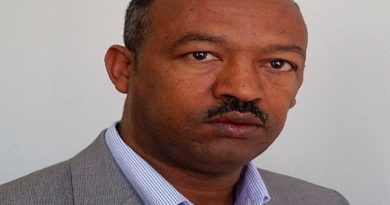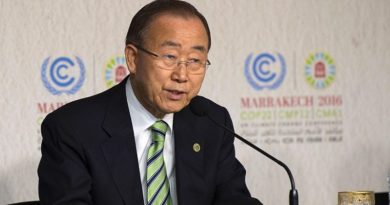World Meteorological Congress adopts new ocean agenda
The World Meteorological Congress has approved a new collaborative framework on the ocean to streamline and enhance WMO ocean activities, boost inter-agency coordination and cooperation, and contribute to the UN Decade of Ocean Science for Sustainable Development 2021-2030.
It endorses a cross-cutting approach, embracing research, observations and forecasting, and service delivery in line with the World Meteorological Organization’s drive towards a more integrated earth systems strategy.
Congress approved the new ocean resolution after a high-level session on Ocean information to deliver weather, marine and climate services for a resilient and sustainable blue economy.
Discussion followed three underlying themes:
The ocean holds the memory in the earth system. The further ahead we want to look, the deeper we need to go to tap into the ocean’s memory.
Changes in ocean temperatures, circulation, stratification and chemistry are causing poleward shifts in species and increased ecosystem stressors such as ocean acidification and ocean deoxygenation.
Most of our cities, population and economic activity is by the coast. Coastal fisheries are an important source of food. Understanding coastal changes and extreme events is critical for protecting our coastal communities, lives, livelihoods and properties.
‘The ocean is a power source for storms and cyclones. Improved prediction of storms, storm surges, waves and other extreme events ensure safer maritime industry and coastal communities’.
Meteorology is crucial to inform humanity’s relationship with the ocean, said UN special envoy Peter Thomson in a video address to the Ocean Dialogue.
“The health of the ocean is in trouble,” he said, citing plastic, urban and industrial pollution and over-fishing. Most pernicious of all is climate change and related ocean acidification, deoxygenation, warming and coral reef destruction.
“The common enemy we have is our greenhouse gas emissions,” said Mr Thomson, adding that the next 12 years would prove decisive in taking action to contain the climate change threat. “History will be harsh to those not part of this common effort for the common good,” he said.
The ocean covers two thirds of the planet. It stores 93 percent of excess heat generated by human activities and is a major sink for carbon dioxide. It has warmed by 0.5° Celsius since the start of the industrial era, said WMO Secretary-General Petteri Taalas.
Climate change is impacting ocean currents, and warmer sea water is increasing the potential for intense tropical cyclones. Sea level rise heightens the dangers of coastal flooding and storm surge, he said.
The need for greater synergies, flexibility and integrated earth system science is driving WMO’s reform agenda and stronger collaboration in the future with partners like UNESCO’s Intergovernmental Oceanographic Commission, said Mr Taalas.
The proposed WMO reform envisages a Joint WMO-IOC Collaborative Board to coordinate development, integration and implementation of activities related to oceanographic and meteorological observation, data and information management, services, modeling and forecasting systems as well as research and capacity development.
Peter Haugan, UNESCO-IOC Chairperson, said the new collaborative board would combine top-down leadership with bottom-up technical expertise in order to leverage the benefits from new technology and public-private partnerships to face growing challenges and to contribute to the sustainable ocean economy.
“We want to transform oceanography into a service to humanity,” said IOC Executive Secretary Vladimir Ryabinin. “The time has come to shape the ocean science for the ocean we want. “
Hiroyuki Yamada, Director, Marine Environment Division, International Maritime Organization (IMO), explained his organization’s commitment to reduce annual greenhouse gas emissions from shipping by at least 50% by 2050 compared to 2008, while, at the same time, pursuing efforts towards phasing them out entirely. Shipping delivers more than 80 percent of global trade.
WMO adopts new ocean agenda
Cooperation with WMO and UNESCO-IOC is essential to fulfill the IMO’s mandate and ensure efficient and safe shipping and a clean and healthy ocean, said Mr Yamada.
“The ocean is critically important for the evolution of our planet,” said Dame Julia Slingo, WMO Special Advisor on Climate. She highlighted the continuing gaps understanding the role of the ocean in the earth system across all timescales from weather to climate, as well as potential solutions in the form of more advanced observing systems and models and new sensor technologies.
“We must not forget the ocean, whenever it rains or the wind blows or when we take a deep breath of air, we should think of the ocean. Not just those who live by the sea but also those who live deep inside the continent, we should think of the ocean,” said Dame Julia, stressing its fundamental role in all weather forecasts.
Dwikorita Karnawati, Permanent Representative of Indonesia, discussed the challenge of delivering coastal and marine services to more than 260 million people, living on more than 17,000 islands in a region which is noted for its volcanic and seismic activity.
On average, there are 4,000 to 5,000 earthquakes in Indonesia per year. In 2017, this jumped to 7,500 and in 2018 there were 11,920 earthquake events. Two separate tsunamis caused by an earthquake in Sulawesi and a volcanic eruption and undersea landslide in the Sunda Strait caused thousands of casualties in Indonesia in 2018.
The disasters underlined the need for a harmonized observation, data and communication system, she said. Currently different agencies are responsible for different data but the government is now seeking to reform the system.
“Without data we are like a blind pilot in the cockpit,” said Ms Karnawati.
The latest developments in ocean modelling and forecasting were presented by Thomas Cuff, Director, National Weather Service Office of Observations, National Oceanic and Atmospheric Administration, USA.
François Gérard, of France’s disaster prevention grouping the Association Française pour la Prévention des Catastrophes Naturelles, addressed the theme of ocean observations.
The resolution passed by Congress envisages restructuring WMO’s ocean agenda to support WMO’s Operating Plan 2020-2023 with the specific objectives:
Strengthening the Global Ocean Observing System (GOOS) within WMO observing and data processing activities and facilitating meteorological and oceanographic observations in coastal regions and the open ocean
Fostering Earth system modelling – coupling ocean with land, cryosphere and atmosphere – to advance science, prediction and services: leveraging the United Nations Decade of Ocean Science for Sustainable Development
Promoting ocean science to support the value chain of the seamless Global Data Processing and Forecasting System and enhancing socioeconomic benefits of marine meteorological and oceanographic services
Better integrating the ocean in multi-hazard early warning with WMO disaster risk reduction, climate applications and services, and research activities (e.g. tropical storm, cyclones, sea level rise and other coastal inundation components)
Raising the capacity of developing countries, including small island developing States, in ocean observation, science and services through an enhanced regional approach




